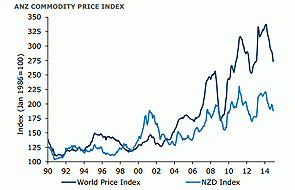
Content sourced from ANZ
The ANZ Commodity Price Index fell a further 4.4% in December – the tenth consecutive monthly decrease in the index.
The index weakened 17% over calendar 2014 – the greatest annual decline in 2½-years.
Nine commodity prices recorded a decrease in December, prices for two commodities increased, while prices for the remaining six commodities were unchanged in the month.
Whole milk powder prices recorded the largest fall in December, falling 11% in the month – to be 52% lower than a year earlier.
Beef prices fell 10% over the month but remain 28% up on a year ago. Skim milk powder prices dropped 9%, aluminium prices decreased 7%, cheese prices slipped 5%, wool prices declined 4%, and sheepmeat and pelt prices weakened 3%.
Intriguingly, the international price of butter defied the drop across other dairy products and rose 8% in the month, but remains 25% below the level that prevailed a year earlier.
Kiwifruit was the other commodity to register a price increase in December, lifting 1% as the Northern Hemisphere export season tailed off.
Prices were unchanged for seafood, apples, casein, venison, wood pulp and sawn timber.
The NZD ANZ Commodity Price Index eased 3.8% in December (-14% y/y), with the kiwi dollar down against the United States dollar, but firmer against the yen, euro, pound and Australian dollar.
In NZD terms, prices are 16% below their March 2011 peaks.
ANZ commodity price index
Select chart tabs
5 Comments
http://www.stuff.co.nz/business/world/64719300/stocks-take-a-dive-on-oi…
2015 likely to be a volatile year.
2001. The symbolic physical hit on World Trade Ctr
2008: GFC
2015: The next stage?
7 Year intervals .....
I dont know for sure , but I reckon we are staring at a DEFLATION problem emerging .
The entire globe has an excess capacity and under-utilisation problem
The recent fall in the Euro will make Eurpoean manufactured goods competitive with Asian goods , and the Asians will reduce their prices to maintain thie sales and / or market share
We have surplusses of almost every commodity and hence the price falls .
China has realised the folly of stockpiling massive quantities of Iron ore , coal, copper , aluminium, and many other metals which are in abundance
Coupled to this is that factories in the manufacturing sector have unused capacity as a result of the 2008 - 2014 recession
In my simplistic view , its all the cumulative consequences of the GFC , QE , Globalisation, rapid advances in technology , and too many people paying down debt instead of borrwing and spending
I don't know if it's "too many people paying down debt". I suspect that a few people are paying down, but the money is being pumped in at the banks and financial levels, which is inflating value of real assets, without putting spending power in the hands of those owners.
Their incomes can only service so much debt, sure they can drop interest rates to make it service more borrowing but that's diminishing return, highly risky and a one way street (eventually they have to pay down debt, as interest rate approaches or passes 0%).
So we're not so much seeing paying down, but dying real capital value, through a kind of devaluation - there is limited inflation because the real incomes of the majority of the public are still very low, limiting the over-the-counter consumption - especially the amount going to online/auction sites where overheads are very low (and thus B2B economic value is low).
Price inflation and borrowing are limited by disposable income - just look at how much went on the plastic this Christmas/NewYear - how do you think that's going to effect available funds over the next 6 - 8 months?? Especially considering much of that was existing inventory, and not likely to be replaced by efficient shop keepers.
We welcome your comments below. If you are not already registered, please register to comment.
Remember we welcome robust, respectful and insightful debate. We don't welcome abusive or defamatory comments and will de-register those repeatedly making such comments. Our current comment policy is here.